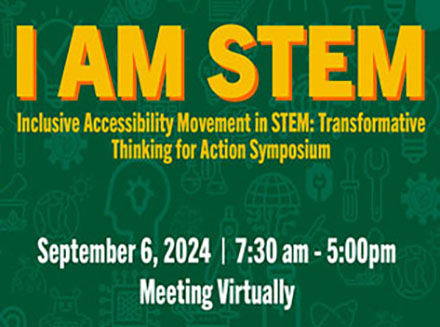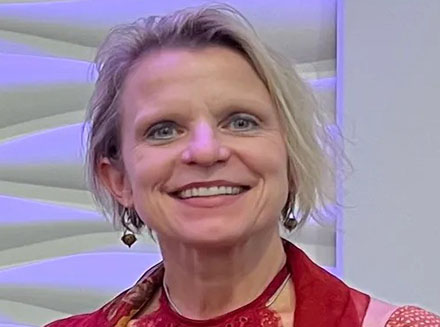By Marc R. Masferrer, University Communications and Marketing
A daylong symposium co-hosted by the University of South Florida will give academic and industry leaders the opportunity to share ideas on how to improve accessibility and success in STEM fields for people with disabilities, from education to the workplace.
The inaugural Inclusive Accessibility Movement in STEM (I AM STEM) Symposium will be virtual from 7:30 a.m. to 5 p.m. EDT on Sept. 6. The symposium is co-hosted by Rochester Institute of Technology and Ohio State University.
“More companies are realizing that disability inclusion is a strategic dimension of their performance,” said event organizer Helene Robinson, director of the Critical & Critical Design Program and a member of the College of Education faculty at USF Sarasota-Manatee. “Using a critical and creative design thinking framework, the symposium will initiate a network of stakeholders in STEM workplaces and education and training who collaboratively learn, apply, reflect on, and disseminate innovative solutions to current accessibility challenges.”

According to Disability In, 65% of the Fortune 500 companies in the U.S. and 72% of Fortune 500 companies in the European Union have deemed disability a material consideration for stakeholders. Because an average of 25% of the population experiences disability, companies want to recruit, develop and retain employees with disabilities to ensure products and services meet the needs of all their customers.
During the symposium, business leaders will share the successes and challenges they have experienced and engage in dialogue about how K-12 schools, universities and STEM employers can work together to improve practices to create success for students with disabilities for STEM careers.
Educators often struggle to accommodate students with disabilities, especially invisible disabilities like neurodiversity, who may not disclose their conditions to their teachers, Robinson said. Fifty-three percent of the Generation Z population identify as neurodiverse, according to a recent survey. By 2030 it is estimated the Gen Z population will make up half the workforce.
In STEM academies, the number of people who disclose their disabilities is lower due to the fear of rejection, the stigma or the impact of its “tinting’ their academic records. When first-year students enroll, they often do not realize the rigor of the STEM field and their need to disclose their disability. Without disclosure, there is no disability accommodation, said Olukemi Akintewe, the director of the first-year engineering program and a faculty member of the USF Medical Engineering Department.
At USF, students with disabilities can apply for a myriad of accommodations based on their needs through Student Accessibility Services.

Helene Robinson
Employers across industries are recognizing that people with disabilities bring value to the company, Akintewe said. A financial services company reported how their Employee Resource Group was often consulted during the prototyping phase of their design process, giving them valuable feedback for product revision before launching to the public.
“Their minds work differently which is an asset for innovation,” Robinson said.
Robinson said audiences that could benefit from participating in the symposium include:
- Faculty in STEM disciplines and from education colleges across the country.
- Human resources professionals.
- Decision makers from STEM industries with an emphasis on those who hire, supervise, or provide ongoing training for STEM and business majors at USF and the other co-hosting universities.
- Employment support organizations serving adults who identify with a disability.
- Disability advocacy organizations.
- Adults who identify with a disability and work in STEM fields.
- Any employees who work in STEM fields and are allies.
The symposium will consist of a series of discussions featuring representatives from higher education and businesses like Boeing, Digital Accessibility by WeCo, and Auticon, which are recognized by the National Organization on Disability as leading disability employers or as partnering with Disability In’s workplace accessibility and inclusion initiatives.
During one of the sessions, participants will explore how early STEM career preparation in academia can address accessibility challenges that STEM professionals will face in internships, onboarding, and early career development.
In the closing session, participants will “discuss plans for an ongoing network to ensure sustainability of this Inclusive Accessibility Movement in STEM to create transformative thinking in action,” the event’s agenda states.
“I am excited to collaborate to create this unique event and long-term network,” said Jennifer Schneider, holder of the Eugene H. Fram Chair in Applied Critical Thinking at the Rochester Institute of Technology. “We need to engage our best thinking to address these challenges, and it starts here. We can elevate our thinking and make an impact from K-12 to university to employment through our innovative and creative methods to design and develop best practices for success.”
For more information and to register, visit the I AM STEM website.